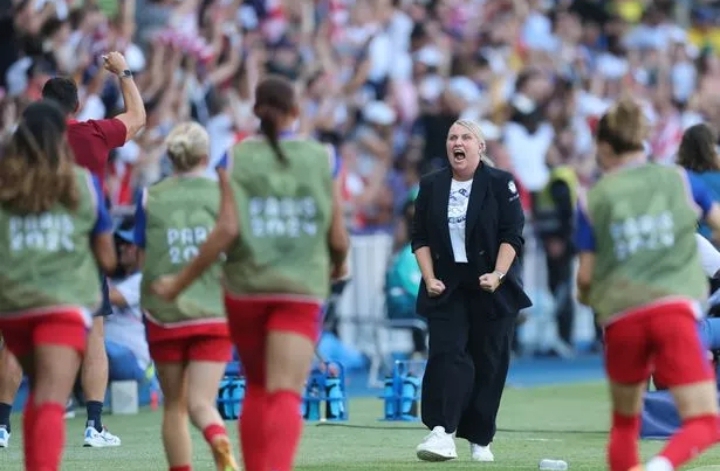Emma Hayes claimed Olympic gold was the pinnacle of her career and vowed that the USA was once again at the summit of women’s football and would remain there.
Chelsea icon Emma Hayes gives an honest take on where Olympic gold ranks among her trophies


Almost a year to the day since they exited the World Cup in Australia in the round of 16—their worst performance in history—Hayes guided them to a tactically inspired 1-0 victory in the final over Brazil at the Parc des Princes.
The seven-time Women’s Super League-winning coach with Chelsea dedicated the win to her late father Sid, who had long told her that the USA was her coaching destiny, while her mum partied in the stands with Tom Cruise and other celebrities.
"Chelsea has been my love; every trophy I won with that football club is very dear to me, but professionally, this is much bigger than anything else I've ever done," said Hayes. "I genuinely believe I joined this team at the right moment. I've had a blast over the last two months. It felt like I was back at university. I just felt lighter than I have in a long time. I know what this job means, but I won’t let it overwhelm me.
"The moment I took on this role, I knew the capability of these players; I knew what they could achieve here. These players were perhaps not ready at the World Cup last year, but they are certainly ready now."
Hayes's decision to leave Chelsea to embark on international management came as no surprise—the USA job is the most coveted in women's football, and she was top of the shortlist as soon as Vlatko Andonovski stepped down.
She credits the time she spent in the USA as a young manager in her mid-twenties, honing her skills with the Long Island Lady Riders and Chicago Red Stars, as being pivotal in her development.
Hayes is also nothing if not searingly honest. The demands of elite-level club coaching were taking their toll on her family life, and her six-year-old son Harry was the first to endorse a move across the Atlantic. However, what happened in Australia was such a traumatic event for those around the USA team that some felt it could take years to rebuild, with tensions around the squad seemingly irreparable.
When Hayes came in and promptly dropped long-time talisman Alex Morgan from her Olympic squad, eyebrows were raised.
It wasn’t just the defeat on penalties to Sweden in Melbourne, but the mild-mannered tameness of their campaign—four goals in as many games were simply unacceptable for a fanbase that demands success and likes to swagger.
"When I moved to America in my twenties, I was coming from a stuffy country that didn’t care about women’s football," she added. "America gave me the opportunities that England never did, which is why this means so much. I almost feel half-American.
"I’ve always had belief—winning is in my DNA. I’m used to being in finals and competing for trophies. The mentality this team has, the never-say-die attitude, it’s why I love the USA, and it’s why I was made for this job.
"We are so excited about our potential, and we are so looking forward to the things we can achieve together. We’re delighted with a gold medal, but we want so much more than this—we’re only just beginning."
In 11 editions of the World Cup, the USA had never finished worse than third and had won it on four occasions. Since women’s football made its Olympic debut in Atlanta, they had won four times and only once finished off the podium.
When it comes to world sport, these are South Korean archery levels of hegemony, but when the rest of the world started to give women’s football the respect it deserved, they were caught flat-footed.
Nobody wins forever, but dominance clearly built a deep-rooted culture of complacency, both inside and outside the squad—something Hayes was quick to address after taking the role just a few months ago.
After just nine games in charge, she has performed a Lazarus-like comeback, with the USA inspired by her attacking trio of Mallory Swanson, whose 58th-minute goal settled this match, Trinity Rodman, and Sophia Smith. Her decision to drop Morgan was totally vindicated.
Known as the 'Triple Espresso,' they’ve injected new energy into the team, scoring nine of their 11 goals in this intense six-match campaign that started just 16 days ago.
With an average age of just 24, these three will be the backbone of the next World Cup campaign and will still be at their peak when this title is defended in Los Angeles.
"Emma has instilled a belief in this group; the players have fully bought in. We talk about the US mentality, and I really felt that at this Olympics," said captain Lindsey Horan.
"Imagine what we can achieve in the next few years before the World Cup. Emma deserves so much credit because we felt the trust and confidence from her. There is so much more in us, so much more potential."
Hayes becomes the sixth British coach to lead a football team to success at the Games, four years after Bev Priestman took Canada’s women to gold in Tokyo. Before then, it was George Raynor with Sweden in 1948 and one-time Crystal Palace manager Adrian Birch in 1912, the last time Great Britain topped the podium.

 বাংলা
বাংলা  Spanish
Spanish  Arabic
Arabic  French
French  Chinese
Chinese 
